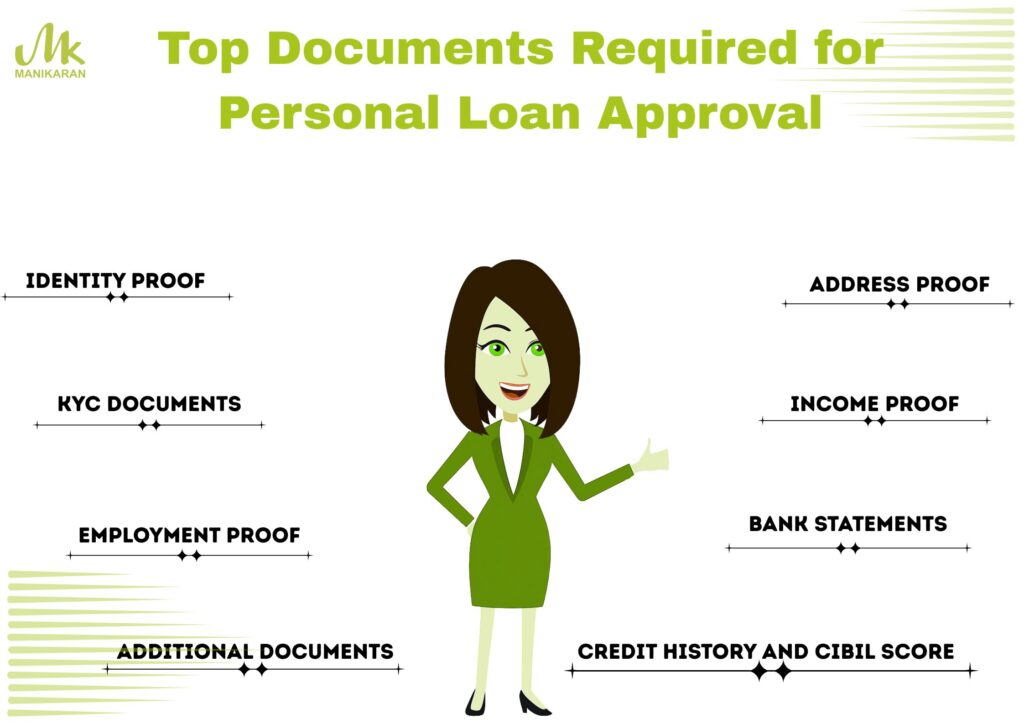Personal loans are perhaps the easiest financial product today, which is used to fulfill sudden financial requirements, organize weddings, get homes renovated, clear debts, or even go for a holiday. But no personal loan is automatic. Banks and Non-Banking Financial Companies (NBFCs) must check your identity, financial health, and ability to pay back the loan before they sanction your personal loan.
This verification process involves the submission of certain documents. Incomplete or missing documents may result in delay or even denial of your loan application. In this blog, we will help you navigate the most critical documents needed for personal loan approval and how to prepare them for a hassle-free and quick approval process.
1. Identity Proof
Identity proof is the bare minimum and fundamental criteria for all personal loan requests. It confirms your identity and ensures that the loan is being approved to a genuine person.
Widely Used Identity Proofs:
Aadhaar Card
Passport
Voter ID
PAN Card
Driving License
Make sure that your documents are genuine and not expired. Lenders would normally demand self-attested copies of these documents with the original for verification.
Why It Matters:
Identity proof assists the lender to avoid fraud, adhere to legal norms, and associate your credit history with your individual profile. PAN cards are especially valuable for loans of more than ₹50,000, as they are used to verify tax.
2. Address Proof
Address proof is necessary to verify your resident status. It assists lenders in ensuring that they can contact you in relation to your loan.
Popular Address Proofs:
Aadhaar Card (if it contains your present address)
Passport
Utility Bills (Electricity, Water, Gas)
Bank Statement or Passbook
Rental Agreement (for tenants)
Driving License
Documents such as utility bills should ideally be recent, usually within the last 3 months. If you’ve recently changed your address, make sure your records are updated.
Why It Matters:
Address proof helps lenders verify your residential stability. It also serves as a point of contact in case of emergencies or disputes.
3. Income Proof
Income proof is needed by lenders to assess your repayment ability. It serves as a proof of your financial position and monthly or yearly income.
For Salaried Employees:
Salary Slips (recent 3–6 months)
Form 16 issued by the employer
Bank Statements reflecting salary credits
For Self-Employed Professionals:
Income Tax Returns (ITR) for the past 2–3 years
Profit & Loss Statement or Balance Sheet
Business Registration Certificate
Bank Statements of your business account
Consistency. Your salary vouchers must be equivalent to your bank statements, and self-employed borrowers need to have ITRs showing constant inflow.
Why It Matters:
Income proof ensures lenders that you will be able to repay the loan on time and aids in calculating your loan amount eligibility.
4. Employment Proof
Employment proof verifies your current professional status. It is especially crucial for salaried employees since it confirms that your income source remains stable.
Common Employment Proofs
Employment Certificate from the employer
Appointment Letter
Recent Salary Slips
HR Letter confirming tenure
Lenders can ask new employees to submit a certificate of completion of probation.
Why It Matters:
Consistent employment reflects steady income, which minimizes the lender’s risk and improves the likelihood of loan acceptance.
5. Bank Statements
Bank statements are a valuable resource for lenders to study your financial habits. They provide a comprehensive record of your transactions, including receipts and expenses.
Tips:
Submit the last 3–6 months’ statements.
Confirm steady salary credits or business revenues.
Prevent frequent overdrafts or sporadic transactions.
Why It Matters:
Bank statements give lenders a clear idea about your financial discipline and liquidity, enabling them to precisely evaluate your repayment capability.
6. Credit History and CIBIL Score
Your credit history and CIBIL score are vital to loan sanctioning. Lenders verify your credit report to analyze your repayment patterns.
Key Points:
CIBIL scores vary between 300 and 900. A good score is above 750.
Good scores enhance your chances of being approved and could lead to lesser interest rates.
Defaults, delays, or pending loans might dent your chances.
Hints:
Get your credit report ahead of time to rectify mistakes.
Don’t apply for lots of loans simultaneously, as multiple applications can adversely impact your score.
Why It Matters:
Having a good credit record assures lenders that you manage loans responsibly, so they lower their risk in lending to you.
7. KYC Documents
KYC (Know Your Customer) requirements are a must for every financial transaction in India. KYC documents overlap with address and identity proof but may sometimes incorporate extra verification.
Typical KYC Documents:
PAN Card
Aadhaar Card
Passport
Voter ID
Tips:
Keep your KYC documents updated and consistent across all financial institutions.
A few lenders will accept digital KYC through video verification or e-signatures.
Why It Matters:
KYC confirms legal authentication of your identity and keeps lending transparent.
8. Collateral Documents (For Secured Personal Loans)
Though secured personal loans are not common, some lenders do provide secured personal loans on the security of collateral like property, gold, or fixed deposits.
Typical Collateral Documents:
Property Documents (in case of mortgage loans)
Gold Ownership Certificate (in case of gold loans)
Fixed Deposit Receipt
Hints:
Make sure that the collateral is owned legally and is free from any disputes.
Have original documents in handy for checking.
Why It Matters:
Collateral mitigates the risk to the lender and can enable you to borrow more money or qualify for a reduced interest rate.
9. Other Documents
Depending on the lender and loan, you may also require:
Passport-size pictures
Loan application form (completed and signed correctly)
Income tax certificates
Evidence of outstanding loans (where consolidating loans)
Tips:
Organize all documents neatly.
Don’t send in handwritten or partial forms.
Why It Matters:
Submitting documents in full at the outset speeds up the approval process and eliminates unnecessary follow-ups.
10. Documenting for a Smooth Approval Process
Proper document organization is very important to prevent delays. Here are some useful tips:
Create a Checklist: Organize all documents needed before applying.
Digital Copies: Keep scanned copies available for online applications.
Self-Attestation: Self-attest wherever necessary.
Multiple Sets: Keep multiple sets of originals and duplicates.
Consistency: Verify names, addresses, and income information is consistent on all documents.
Tidy documents save you and the lender time, speeding up your loan approval process.
Frequently Asked Questions on Personal Loan Documents
1. Is it possible to apply for a personal loan without a PAN card?
It is possible for most lenders to require a PAN card, particularly for loans that exceed ₹50,000. A few NBFCs can accept different ID proof, yet PAN is highly advisable.
2. How up-to-date should my proof of income be?
Salaried: Salary slips and bank statements for the past 3–6 months. Self-employed: ITRs for the past 2–3 years.
3. Are electronic copies of documents okay?
Yes, most lenders accept scanned copies in online applications, though originals might be asked for during verification.
4. What if my documents show discrepancies?
Any discrepancy in the documents can cause delayed approval or even rejection. Always double-check information prior to submission.
5. Do I require collateral for a personal loan?
Personal loans are mostly unsecured. Collateral is needed only for secured loans and can get you better loan amounts or interest rates.
Quick Tips for Faster Approval
Keep all documents updated and complete.
Have a healthy CIBIL score.
Don’t apply for multiple loans at once.
Submit self-attested copies along with originals.
Arrange your documents in a coherent order to make verification simple.
Conclusion
Obtaining a personal loan approved need not be a cause for worry. With knowledge of the most important documents needed for personal loan approval and making sure they are complete, recent, and correct, you can increase your prospects of speedy approval.
Accurate documentation, orderly submission, and uniform details in all papers ensure that the process is flawless. With everything accomplished, you can have a hassle-free personal loan experience and go after your financial objectives.



